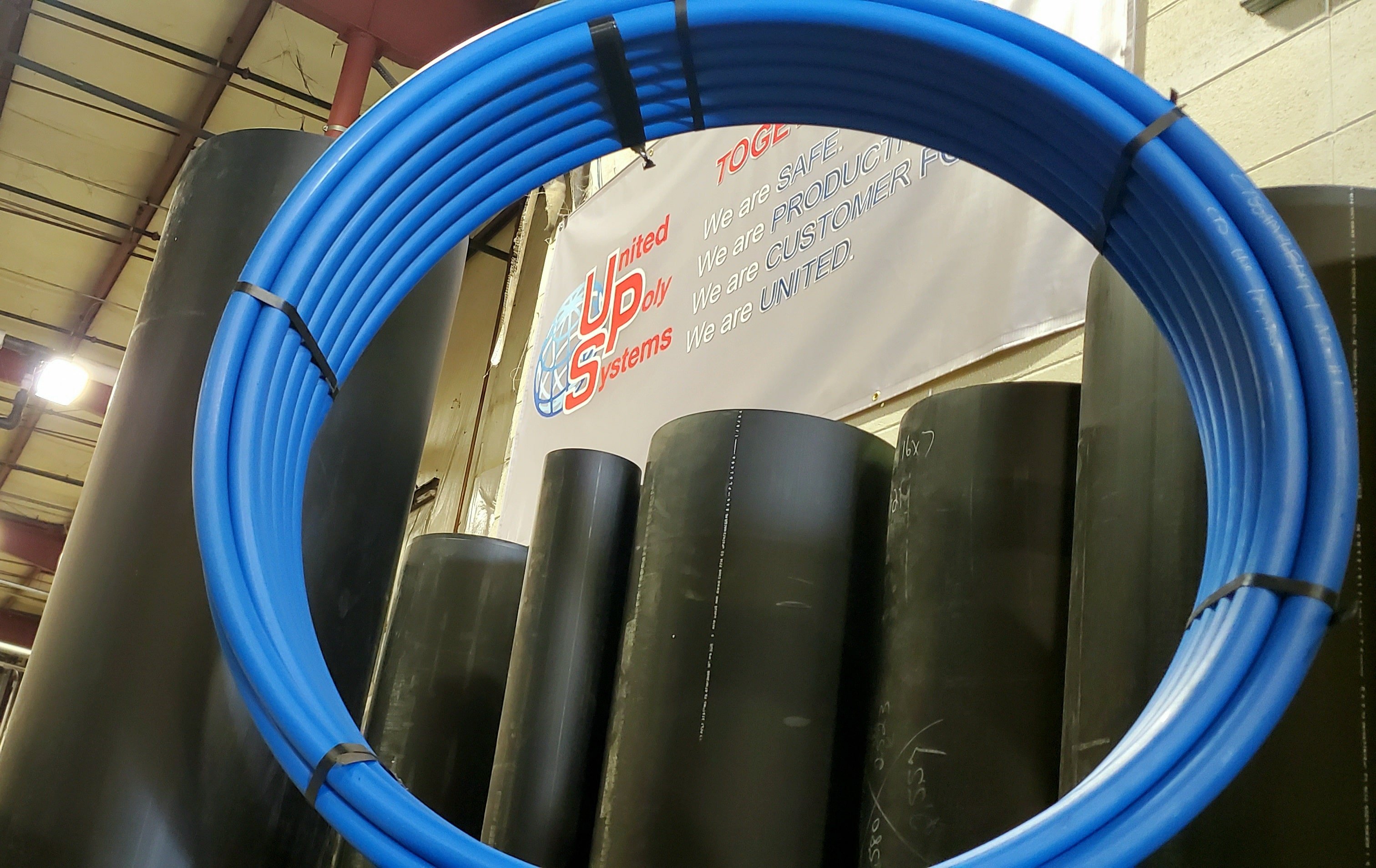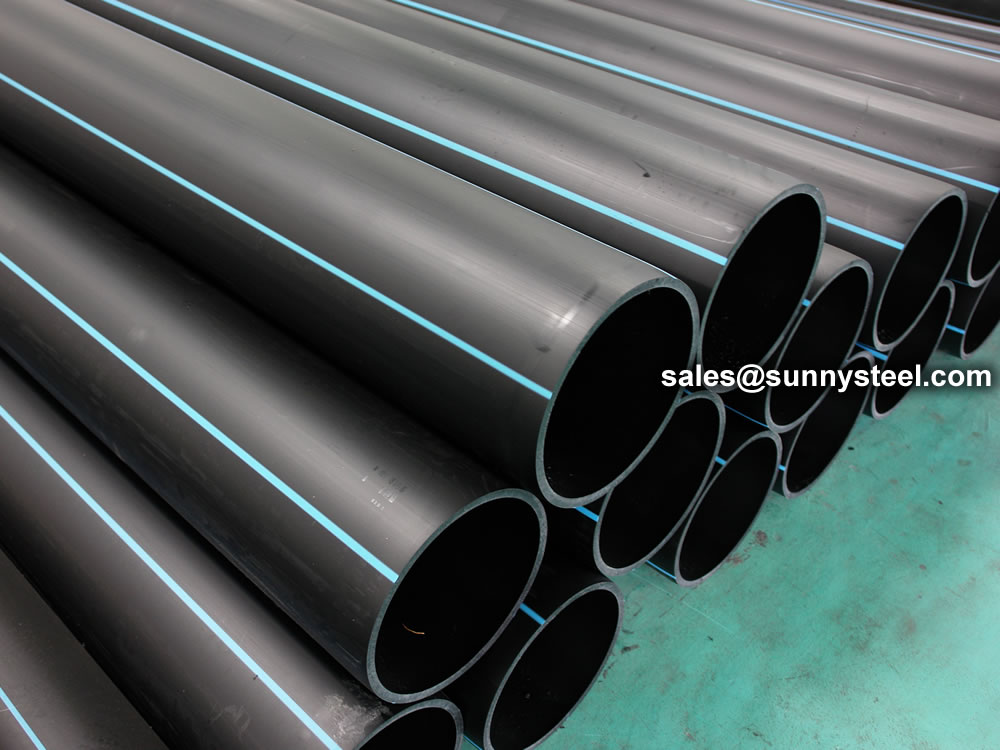American Plastics HDPE Pipe for Oilfield: Durability in Harsh Environments
A Comprehensive Guide to the Various Uses HDPE Pipe in Building And Construction and Market
HDPE pipes have actually become a crucial part in contemporary building and commercial applications. Their special residential or commercial properties, such as resistance to corrosion and lightweight layout, make them suitable for a large range of usages. From water supply systems to agricultural watering, HDPE pipes offer remedies that improve effectiveness and sustainability. Understanding their diverse applications is necessary for experts looking to maximize facilities. What specific advantages do these pipelines offer each field?
Water Supply and Distribution Systems
Water system and distribution systems are essential components of city framework, typically depending on high-density polyethylene (HDPE) pipes for their sturdiness and performance. These systems transportation safe and clean water from treatment centers to customers, ensuring availability and safety. HDPE pipelines are preferred for their resistance to deterioration, chemicals, and extreme temperature levels, which enhances their durability and lowers upkeep expenses. Additionally, their light-weight nature permits much easier installment and transport, making them perfect for numerous urban and rural applications.
The adaptability of HDPE pipelines allows them to be set up in limited spaces and around barriers, minimizing the need for substantial excavation (custom hdpe pipe manufacturing Midland TX). Their smooth interior surface area minimizes rubbing losses, boosting water flow rates. As cities remain to expand, the need for reputable water systems increases, positioning HDPE pipes as a lasting service for modern-day framework tasks. Their tried and tested performance history makes them a favored choice amongst designers and city planners alike
Wastewater Administration and Treatment
Efficient wastewater monitoring and treatment are crucial for preserving public health and ecological top quality. HDPE pipelines play a vital duty in this process due to their sturdiness, resistance to deterioration, and ability to stand up to extreme chemicals. These pipes are commonly utilized in various applications, consisting of sewer system, stormwater water drainage, and wastewater therapy centers. Their light-weight nature assists in simpler installment and transport, reducing labor expenses and time.
On top of that, HDPE pipelines have a smooth indoor surface that minimizes friction loss, promoting reliable circulation rates. They are likewise less susceptible to leakages and failings compared to conventional products, making sure that contaminants are consisted of effectively. In addition, their versatility enables adaptability in different soil conditions, making them suitable for diverse ecological settings. As sectors progressively prioritize lasting practices, the use of HDPE pipelines in wastewater management systems lines up with goals for decreasing ecological impact and boosting source healing.
Agricultural Watering Solutions
In farming settings, reliable watering solutions are important for optimizing crop yields and taking care of water resources. HDPE (High-Density Polyethylene) pipelines play a crucial duty in contemporary irrigation systems due to their durability, adaptability, and resistance to corrosion. Their capacity to endure high pressures makes them perfect for both surface area and subsurface irrigation applications, guaranteeing consistent water circulation across areas.
Farmers can use HDPE pipelines in drip watering systems, which deliver water directly to plant roots, reducing wastage and advertising healthy growth. Additionally, these pipelines are lightweight and easy to set up, decreasing labor costs and installment time. Their long life expectancy and low upkeep demands even more improve their allure get more info in agricultural practices.
HDPE pipes are environmentally friendly, as they can be recycled and do not seep unsafe chemicals right into the dirt. This makes them a lasting choice for farmers aiming to embrace green farming methods while making best use of performance.
Industrial Applications and Procedures
Adaptability is a hallmark of HDPE pipes, making them crucial in various industrial applications and procedures. These pipes are commonly used in chemical processing industries as a result of their exceptional resistance to a variety of harsh materials. HDPE's light-weight nature, integrated with high tensile toughness, permits easy installment and lasting performance popular atmospheres.
In the oil and gas field, HDPE pipelines play an important duty in delivering hydrocarbons and gases, many thanks to their resilience and adaptability - custom hdpe pipe manufacturing Midland TX. Additionally, they are employed in mining operations for the transportation of slurry and various other materials, where standard piping systems may stop working
HDPE pipes are increasingly used in manufacturing centers for water supply lines and wastewater monitoring. Their capability to stand up to extreme temperatures and pressures makes them appropriate for a range of commercial processes. Generally, HDPE pipelines add significantly to efficiency and safety and security throughout varied commercial applications.
Stormwater Management and Water Drainage Solutions
Stormwater monitoring and drainage systems are vital components in city framework, developed to manage excess rains and minimize flooding risks. High-density polyethylene (HDPE) pipelines are increasingly utilized in these systems due to their longevity, flexibility, and resistance to rust. These pipelines effectively carry stormwater far from booming locations, minimizing surface drainage and avoiding waterlogging.
HDPE's lightweight nature facilitates simpler installment, decreasing labor prices and building and construction time. Furthermore, its resistance to chemicals and environmental stress factors guarantees long life and integrity in different climates. In enhancement to standard drainage applications, HDPE pipelines are likewise utilized in ingenious remedies such as green facilities, which includes rain yards and absorptive pavements.

Often Asked Concerns
Just How Does HDPE Pipe Contrast to PVC Pipeline in Price?
As a whole, HDPE pipeline has a tendency to be more costly than PVC pipe as a result of its boosted longevity and versatility. Nevertheless, long-term expense considerations, such as maintenance and life-span, may prefer HDPE in details applications.

What Is the Life-span of HDPE Water Lines Under Numerous Conditions?
HDPE pipelines commonly have a lifespan of 50 to 100 years, depending upon environmental conditions, installation methods, and usage. Aspects such as temperature level, soil type, and exposure to chemicals can greatly affect their toughness.
Can HDPE Water Lines Be Recycled After Use?
Yes, HDPE pipelines can be reused after use. The recycling procedure involves melting down the product, allowing it to be repurposed into brand-new items, thereby advertising sustainability and decreasing ecological influence connected with plastic waste.
Are There Any Kind Of Particular Setup Difficulties With HDPE Pipelines?
Installment difficulties with HDPE pipelines consist of appropriate jointing techniques, ensuring adequate trench conditions, and managing thermal growth. In addition, knowledgeable labor is required to take care of specific equipment, which can make complex the installment process in numerous settings.

What Qualifications Should I Look for When Purchasing HDPE Water Lines?
When purchasing HDPE pipes, one need to look for certifications such as ASTM, AASHTO, and ISO, which confirm top quality and conformity with industry criteria, guaranteeing toughness and efficiency in various applications. - Pipe Manufacturing Midland TX